Subtotal: $
Checkout-

How Math Makes You a Better Person
-

Should I Read Scary Fairy Tales to My Child?
-

Lernvergnügenstag: A Day for the Joy of Learning
-

Readers Respond
-

Sister Penelope in Expectation
-

The Most Valuable Joads
-

Timber Framing with Teenagers
-

Iron Sharpens Iron
-

Educating for Freedom
-

Why I Became a Firefighter
-

Does Teaching Literature and Writing Have a Future?
-

Schools for Philosopher-Carpenters
-

Deerassic Park
-

Why We’re Failing to Pass on Christianity
-

For the Love of Public School Teaching
-

Let Children Play

Reverence for the Child
Four thinkers prepare us to come into the presence of children.
By Eberhard Arnold, Maria Montessori, James Baldwin and John Chrysostom
January 12, 2025
Available languages: Deutsch
Next Article:
Explore Other Articles:
Eberhard Arnold
Anyone who wants to live with children must first of all recognize his own incapacity for justice in the deepest sense.
How difficult educating children is for us human beings, who are not free of sin, and what a responsibility! Only wise men and saints are fit to be educators. Our lips are unclean. Our dedication is not without reservation. Our truthfulness is broken. Our love is not perfect. Our kindness is not disinterested. We are not free of lovelessness, possessiveness, and selfishness. We are unjust.
So it is the child who leads us to the gospel. If we look at our task with the children, it is quite clear that in view of the holiness of the task, we are too sinful to bring up even one child. This recognition leads us to grace. Without the atmosphere of grace, no one can work with children. Only one who stands like a child before God can educate children, can live with children.
“You must become like children.” Like children, you must live in the presence of grace. You must learn wonder. In the knowledge of your own smallness, marvel at the greatness of the divine mystery that lies hidden in all things and behind all things. Only then can we be given the vision of this mystery, a vision that makes us forget ourselves because it overwhelms us with the greatness of the cause. Only those who look with the eyes of children can lose themselves in the object of their wonder.
Educating means struggling shoulder to shoulder with the children under one leader, Jesus Christ. Not that the educator fights the child or the pupil fights the teacher in their common struggle against lovelessness and untruthfulness. That is impossible. The real struggle can begin only when we have realized that we all sit on the same bench and are all in need of strength from above.
Eberhard Arnold, Children’s Education in Community: The Basis of Bruderhof Education (Plough, 1976, 2017), 13–15.
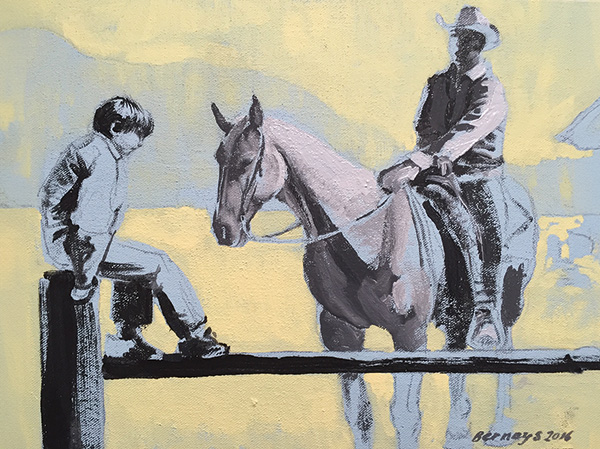
Amy Bernays, Homework before Horses, acrylic on canvas, 2016.
Maria Montessori
The educator must be as one inspired by a deep worship of life, and must, through this reverence, respect, while he observes with human interest, the development of the child life. Now, child life is not an abstraction; it is the life of individual children. There exists only one real biological manifestation: the living individual; and toward single individuals, one by one observed, education must direct itself. By education must be understood the active help given to the normal expansion of the life of the child. The child is a body which grows, and a soul which develops; these two forms, physiological and psychic, have one eternal font, life itself. We must neither mar nor stifle the mysterious powers which lie within these two forms of growth, but we must await from them the manifestations which we know will succeed one another.…
To give an idea of preparation of the spirit let us try to enter into the minds and hearts of those first followers of Christ Jesus as they heard him speak of a kingdom not of this world, greater far than any earthly kingdom, no matter how royally conceived. In their simplicity they asked of him, “Master, tell us who shall be greatest in the kingdom of heaven!” To which Christ, caressing the head of a little child who, with reverent, wondering eyes, looked into his face, replied, “Whosoever shall become as one of these little ones, he shall be greatest in the kingdom of heaven.” But let us seek to implant in the soul the self-sacrificing spirit of the scientist with the reverent love of the disciple of Christ, and we shall have prepared the spirit of the teacher. From the children themselves he will learn how to perfect himself as an educator.
Maria Montessori, The Montessori Method, trans. Anne E. George (Frederick A. Stokes Company, 1912).
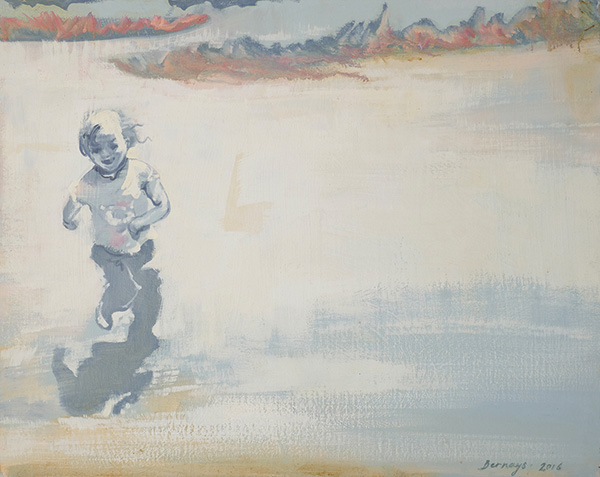
Amy Bernays, Pink Run, oil on canvas, 2016.
James Baldwin
So any citizen of this country who figures himself as responsible – and particularly those of you who deal with the minds and hearts of young people – must be prepared to “go for broke.” Or to put it another way, you must understand that in the attempt to correct so many generations of bad faith and cruelty, when it is operating not only in the classroom but in society, you will meet the most fantastic, the most brutal, and the most determined resistance. There is no point in pretending that this won’t happen.
Since I am talking to schoolteachers and I am not a teacher myself, and in some ways am fairly easily intimidated, I beg you to let me leave that and go back to what I think to be the entire purpose of education in the first place. It would seem to me that when a child is born, if I’m the child’s parent, it is my obligation and my high duty to civilize that child.… The paradox of education is precisely this – that as one begins to become conscious one begins to examine the society in which he is being educated. The purpose of education, finally, is to create in a person the ability to look at the world for himself, to make his own decisions, to say to himself this is black or this is white, to decide for himself whether there is a God in heaven or not. To ask questions of the universe, and then learn to live with those questions, is the way he achieves his own identity. But no society is really anxious to have that kind of person around. What societies really, ideally, want is a citizenry which will simply obey the rules of society. If a society succeeds in this, that society is about to perish. The obligation of anyone who thinks of himself as responsible is to examine society and try to change it and to fight it – at no matter what risk. This is the only hope society has. This is the only way societies change.
James Baldwin, excerpt from “A Talk to Teachers” from The Price of the Ticket: Collected Nonfiction 1948–1985. Originally published in The Saturday Review (October 16, 1963). Copyright © 1963 by James Baldwin, renewed 1991 by Gloria Baldwin Karefa-Smart. Reprinted with the permission of The Permissions Company LLC on behalf of the James Baldwin Estate. All rights reserved.
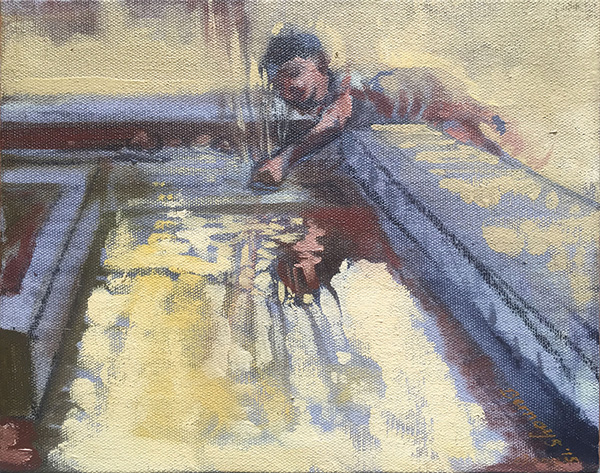
Amy Bernays, The Water Lesson, oil on canvas, 2015.
John Chrysostom
Let everything take second place to our care for our children, our bringing them up in the discipline and instruction of the Lord. If from the beginning we teach them to love true wisdom, they will have greater wealth and glory than riches can provide. If a child learns a trade, or is highly educated for a lucrative profession, all this is nothing compared to the art of detachment from riches; if you want to make your child rich, teach him this. He is truly rich who does not desire great possessions or surround himself with wealth, but who requires nothing. This is how to discipline and teach your child; this is the greatest of riches. Do not worry about giving him an influential reputation for worldly wisdom, but ponder deeply how you can teach him to think lightly of this life’s passing glories; thus he will become truly renowned and glorious. Whether you are poor or rich, you can do this; these lessons are not learned from a skillful professor but from divine revelation.
Do not ask how he can enjoy a long life here, but how he can enjoy an infinite and eternal life in the age to come. Give him the great things, not the little things. Do not strive to make him a clever orator, but teach him to love true wisdom. He will not suffer if he lacks clever words; but if he lacks wisdom, all the rhetoric in the world cannot help him. A pattern of life is what is needed, not empty speeches; character, not cleverness; deeds, not words. These things will secure the kingdom and bestow God’s blessing. Do not sharpen his tongue but purify his soul. I do not mean that worldly learning is worthless and to be ignored, but it should not be an exclusive preoccupation.
Saint John Chrysostom, “Admonitions for Parents,” from The Path to Salvation, by Saint Theophan the Recluse (Saint Paisius Monastery, 2006), 333–334.
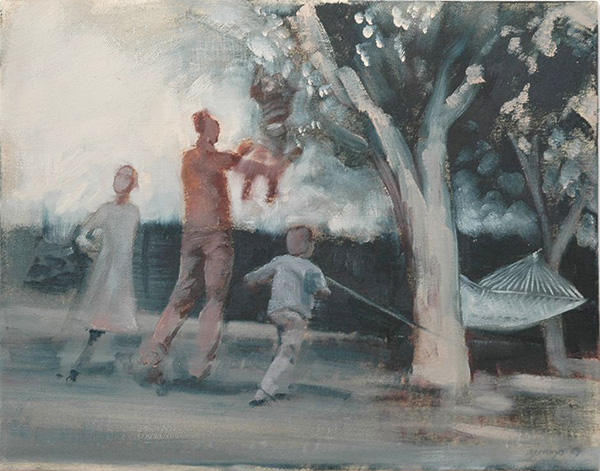
Amy Bernays, Garden Games, oil on canvas, 2014.
Already a subscriber? Sign in
Try 3 months of unlimited access. Start your FREE TRIAL today. Cancel anytime.





























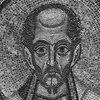
Linda and John wilson
A good teacher is one that wants to prepare future generations for the world they will enter. However, the teacher must realize she is the product of her own education. The reason I know Plato was a good teacher is because he taught Aristotle and Aristotle went on to become one of the most effective challengers of Plato’s thought. Plato taught Aristotle not what to think, but how to think. This is what a good teacher does. When my students can effectively challenge what I teach, I know I have taught them well. If we do not want our students to passively accept what society tells them we must begin by instructing them not to passively accept what we, their teachers, tell them, though this can be scary at times. Schopenhauer said “All truth passes through three stages. First, it is ridiculed. Second, it is violently opposed. Third, it is accepted as being self-evident.” Jonathan Swift said, “When a true genius appears in the world, you may know him by this sign, that the dunces are all in confederacy against him.” Many similar sentiments have been expressed by others; this is not a new idea. We must be careful, though. Just as everything that was once thought true and wise is neither true nor wise, so also not all new “truths” or new “wisdom” are either true nor wise. Education, that is being taught well and learning well, shows us how to assess thoughtfully new and received wisdom and truth. The more educated we are and the more we use the tools of thought that education gave us, the less likely we are to be fooled, though it is no guarantee in itself. I was enriched by all of these thinkers and teachers. Cordially, J. D. Wilson, Jr.